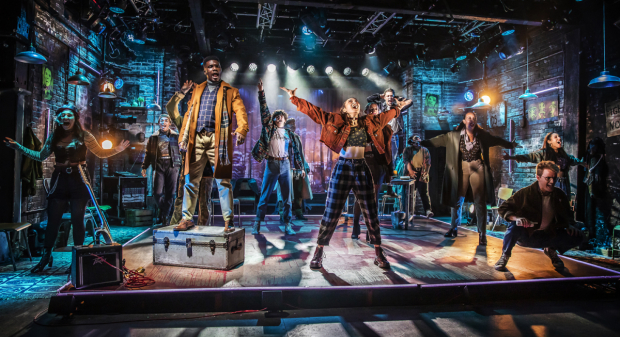
© Pamela Raith
The Hope Mill's production of Rent was in the planning since 2019, but only played five live performances in November 2020 before it was closed by lockdown. Some audiences were saved by a livestreamed run, but the hope was always to give it the full stage life it deserved. It now makes that triumphant return, and Luke Sheppard's production only blazes brighter amidst our own recovery from a period of fear and loss.
The theatre's brick walls again become the Manhattan apartment of a group of friends trying to make a living as artists in 1980s America. But several are merely trying to survive, their AIDS diagnosis making them increasingly ill as they try to find love and an artistic legacy to leave behind.
After more months of lockdown, the themes are even more arresting than before. Candles reflect both the hope and loneliness of aspiring filmmaker Mark (Luke Bayer, joining the show for this run) with his camera, and musician Roger (a returning Tom Francis) with his guitar. You notice the distance — lovers' hands held slightly apart, unsure both of committing to each other and of transmitting AIDS — especially in "Without You", with its long, suspended notes, full of yearning.
Mark's caught in the conflict of documenting the suffering, but risking exploiting it rather than freeing them from victimhood. The design shows this danger of him fixing them inside the nightmare, with electricity crackles and projected video appearing like we're inside his camera. Likewise, Roger is crippled by the loss of his girlfriend, but fearfully pushes away the love of Mimi (Maiya Quansah-Breed) which could heal it. His emotional temperament, thrashing between these desperate states of love and sorrow, is captured in Francis' voice like a motorbike engine, emitting roaring surges and gentle purrs.
The play's haunted by a fear of dying and confronting this reality. The advent of Christmas is marked by cynical interludes, as the passing of time means the running out of time. We hear that pain in the rasp and crackle of their voices, and see it play out in the poignant contrast in Collins' relationship with the young drag queen Angel (Alex Thomas-Smith). His warm smile and adoring looks into Angel's eyes seem to desperately believe he can rescue him, while Angel's pitiful looks back and brusqueness imply a realism about their helplessness. In their bittersweet confession of love, "I'll Cover You", Dom Hartley-Harris' voice quivers like a wounded animal.
Larson cleverly embeds this conflicting rhythm into the musical structure: sad ballads are followed by uplifting, riotous anthems, not just offsetting but rallying against the bleakness.
But it's the stirring ensemble dynamic that really achieves. Just as the LED bar around the central stage often resembles a vein throbbing with the characters' defiant energy (lighting designer Howard Hudson), they're permanent spectators who act as a lifeline of support. They assemble onstage to urge characters to let go, or remedy their anguish with music; at other times, they transfer strength with the jolting, thrusting limbs of their dancing, lit from beneath with fiery oranges like an igniting furnace.
It's such a rich production, but singular images are equally powerful: solitary candles; an empty chair for a lost lover; angel wings suggested by a wispy white sheet. While you're nourished and overwhelmed by the vocals, your eyes are caught by tentative fingers reaching out across the space. There's a lot of it — perhaps Larson didn't need songs about bar orders, or Maureen's absurd performance — but it's all so good, it works so perfectly in this space and we're so lucky it's been brought back.












